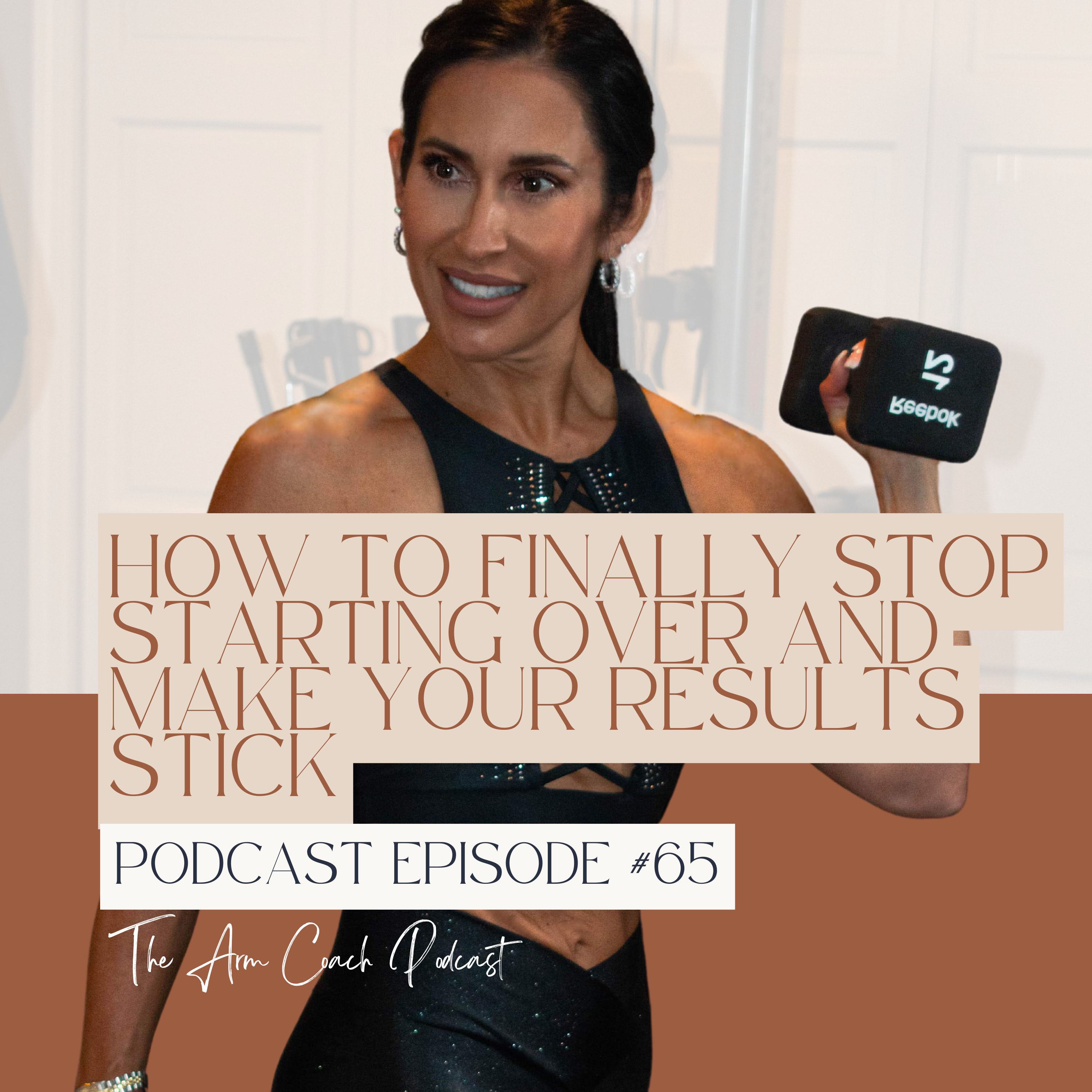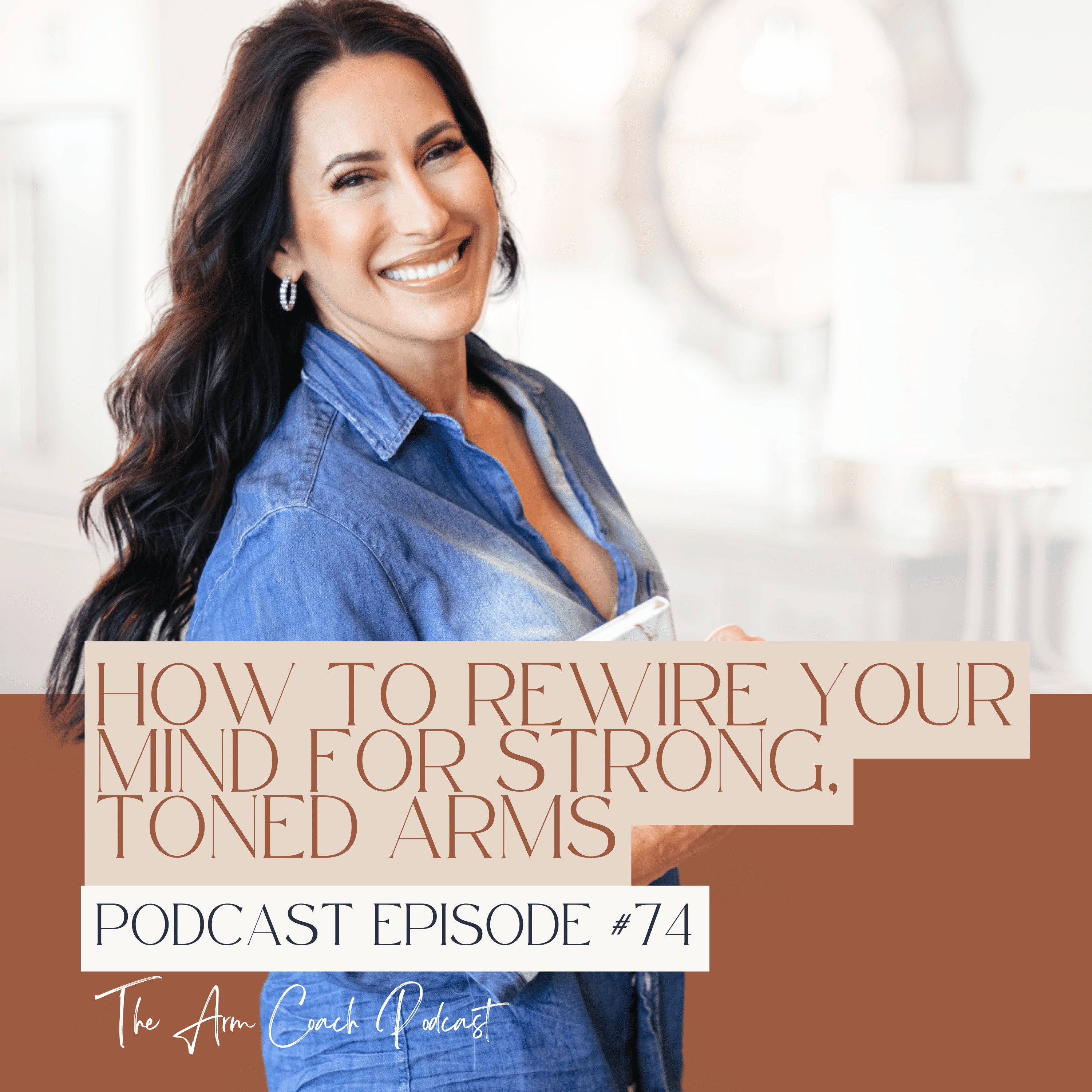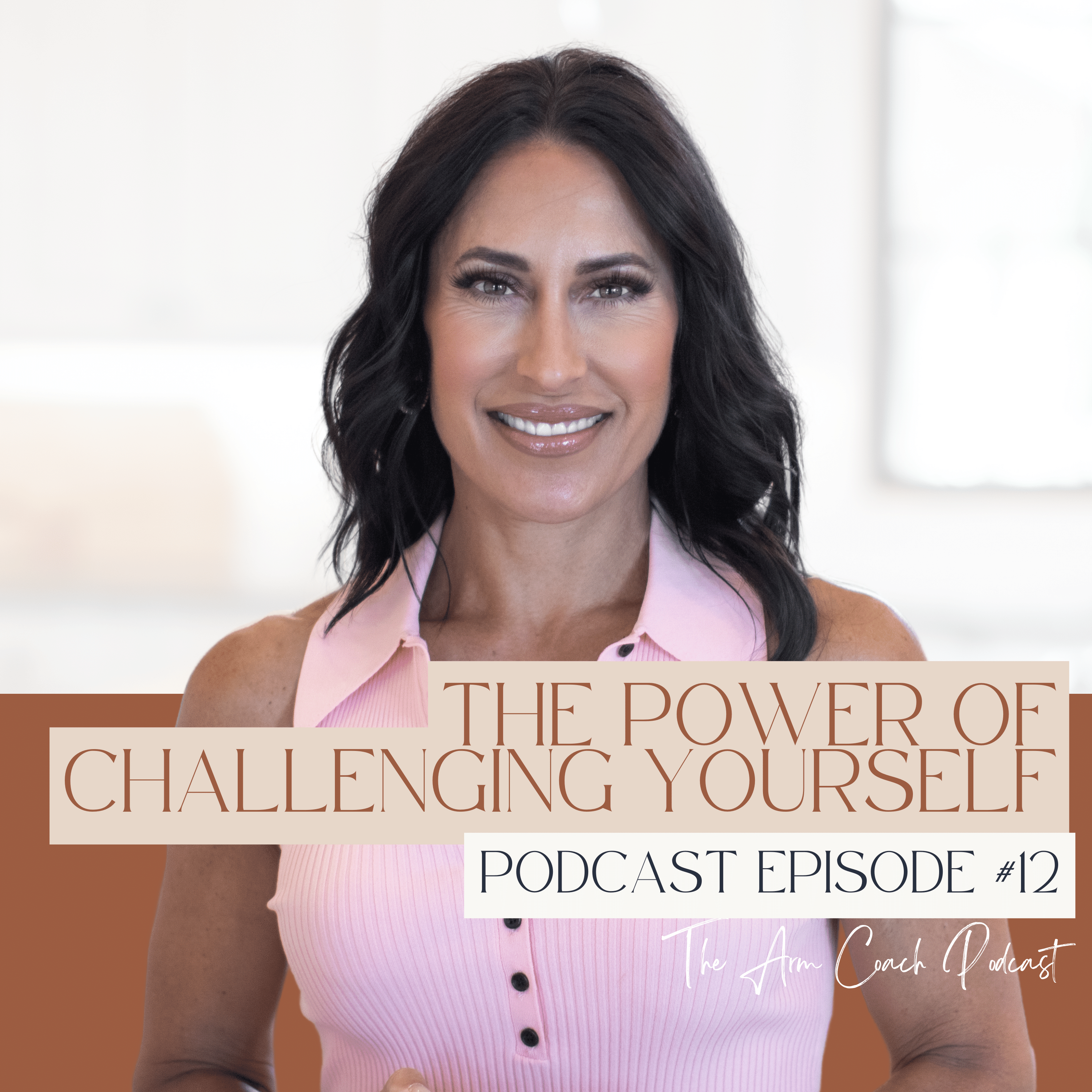Episode Transcript
Today we're going to talk about why thinking that toned, sculpted
arms should be easy, is not working for you and what you should
think instead.
Hey everyone! Welcome to The Arm Coach podcast, episode 51! Do you
ever hear yourself saying, ‘This is too hard’? That working out and
mindful eating should be easy? Because if you do, you may be doing
yourself a big disservice. So what we're going to talk about today is how
we define sculpted arms is hard. And when you make changes, why it
naturally might be challenging. And when you say ‘this is hard’, what
actually happens inside your brain and how it affects what you do and
how you eat. We're going to talk about how to reframe hard, and
possibly talk about why hard can be a good thing. And I'm going to
introduce you to a worksheet that I use with all of my clients. So here we
go.
Do you think that getting what you want, which could be in the
area of body work or weight or could be in any area of your life,
that it should be easy? When you're trying to reach a goal and
it's difficult, you assume that anything that's hard, is too hard.
And then guess what? You stop trying. You also might think that
when things are hard, that it's not fair. You think things should be
easier for you. Well, this is the problem. It's your thinking that
things should be easier, and that it's not fair if they're challenging.
So we're going to talk today, and I'm going to show you why
hard is good, and how to stop thinking that easy is your goal.
So let me ask you this. How often have you heard yourself say,
‘but it's so hard’. I can certainly think of more than a few times
that phrase has come out of my mouth. And many, many, many
times that I've heard that come out of my clients. And I would bet
that you aren’t that different. When you say something is hard,
how do you feel? I know that I feel burdened, I feel overwhelmed,
and I feel a little hopeless, with maybe a little touch of dread.
Who would want to put effort into something that feels really bad,
right from the beginning? When you think something is hard, your
knee jerk reaction is to feel bad. And then either to avoid it like
the plague, or to go through it really grudgingly with dread,
waiting for that sky to fall. When you feel dread, hopelessness, or
a sense of being overwhelmed, you probably tend to give very
little effort, because you're thinking, why bother. Or maybe you
do it kind of half assed, because you think you'll probably fail
anyway, because it's so hard. Not a great way to start an arms
sculpting program or any project in your life. And you probably
know some of this, but I'm calling your attention to it, because
being even just a little bit unconscious of this way of thinking, is
going to definitely keep you stuck.
Now wouldn't it be cool to start approaching a goal with
excitement, or zest, or at least peace. You can, and here's how.
You need to reframe the idea of hard. And you need to think
about why it's come to mean something negative to you. So
what types of things do you usually label as hard? Things that
take you outside of your comfort zone. Things that make you
stretch beyond what you expected or what was required of you.
And here's the big one. Especially for fitness and losing weight.
Things that have no immediate payoff, no instant gratification.
Because you're probably thinking something like ‘you mean I
have to eat mindfully, and lift weights, and move my body,
without seeing an immediate 10 pound weight loss and
definition’. I know you may have thought that. Many people do.
But here's a new way to look at the concept of hard. Who says
that hard has to be something bad or something to be avoided at
all costs? We are wired, and that includes you, to actually like
and thrive, doing hard things. Humans are given the intellectual
ability to figure things out. Problems stimulate you, if you
approach them the right way. For instance, I know that if you
think that's hard, you might feel dread. If you think instead, ‘Wow
that's challenging’, you might feel stimulated, or even excited.
Sometimes, you probably tend to think that you want life to be
easy peasy, right? No problems, no hurdles, no learning curve.
Just simple. But guess what? It's not really true. Of course, you
don't want mountains to have to climb over everything you do in
your life. We'd all love things to go smoothly. But when they
don’t, remember that your brain is designed to find solutions to
everything you encounter. You can find solutions. So just imagine
how differently you might go through life if your motto was, ‘I can
figure this out’, instead of, ‘oh no, a problem’. When you're
beginning a new fitness program, check the conversation that's
going on in your mind. If you find yourself worrying about how
hard is going to be, you're setting yourself up to start your
program with a huge weight on your shoulders. Not exactly a fun
way to live and get things done. But if you can think about
starting a new fitness program and accept that there will be
challenges, you'll feel differently. And you'll be so much more
likely to look for solutions and do well. Be interested and
compassionate as you tune into your own mind.
I want you to take a few minutes to go back in time to the last
couple of ‘change your body efforts’ you made. Did you go into
those programs thinking about how hard it was going to be?
Well, now is time for a fresh start. Because by seeing roadblocks,
as temporary challenges that you can figure out, you're much
more likely to stick to your program. You're much more likely to
reach your goals, and you are much more likely to feel great,
while you're doing so. If you can begin to catch yourself when
you start thinking, ‘things just should not be so darn hard’, you
will benefit from changing your mantra to ‘I've got this’. Take a
moment and explore how you usually react to challenges. And I
want you to see how easy it is to create new responses to life's
little or big trials.
And now I want to walk you through this worksheet that I use
with my private clients very frequently because if they start a
program with me, even with intense, high attention from me,
coaching one on one, they're still going to trip over their own feet
if they have this secret thought that ‘This is too hard for me. Life
is too hard. Sculpting my arms is too hard. Changing my habits is
too hard’. So the worksheet is called Learn to welcome doing
hard things. If you're past the age of 12, you've probably figured
out that life can be challenging, right? And if you fear and shy
away from challenges, you don't grow. If you fear hard things,
you can never get what you really want, unless what you desire is
very small and easy. And when you do go through challenging
times and come out the other side, you're stronger. You feel
great. Your image of yourself expands, and suddenly you feel like
you can take on the world. Your goal is to stop being put off by
hard things. I want you to view them instead, as things that are
valuable and worth striving for. Sculpting your arms does not
have to be a struggle. Yet, it may not be simple either.
So let's take a look at your current attitude toward hard things.
Now you might want to grab a pen and paper and start jotting
down your answers to these questions. So first, think of a time
that you went through a big challenging experience. And after
you got through it, think about how you felt. It could be in your
personal life, it could be at work, it could be in relation to a
relationship that you're in. It could just be a personal challenge of
something that you were trying to improve, or maybe it was a
health challenge. But after you got through it, how did you feel?
Did you feel relief? Probably. But did you also feel proud that you
got through it? Did you feel like you suddenly could look at
yourself in a slightly different way? Now, look at this. Think about
that same situation that you just thought about or wrote about.
What did you tell yourself? Remember it was a challenge, what
did you tell yourself when you ran into roadblocks? Because you
will run into roadblocks. That's a part of life. Did it feel good, or
did it feel bad? When you were going through a challenge, and
something came up that blocked you, or at least put a bump in
the road, did you feel like, ‘what am I going to do? how am I
going to do this? this is too much. this is too hard.’ or, ‘Oh, okay,
I'll just figure this out and then I can move on’. And then ask
yourself, what is your general inner motto. Is it more often, 'Oh
no’, or is it more like ‘I'll figure this out’. You probably heard me
say this before but I'm very proud of my kids, who frequently will
come up against obstacles like everybody else. Not so much in
the area of weight and eating, but more in the area of life and
work and relationships. And they are no exception to the rule that
life can be challenging. But what they learned from an early age,
and what has now become their personal motto, whether they're
aware of this or not, is that they both believe that they can figure
things out. And that's what I would love for you to consider as
you are on the road, come up against a challenge, run into a
roadblock, and if your automatic thought up until this point is, ‘oh
no’, I want you to just try out and see what it feels like by
substituting the thought, ‘I will figure this out’. Because I will
figure this out’, implies that you don't know the answer yet, right?
And that's common. When you run into something different that's
blocking your way to progress, to achieving a goal, to getting
through some part of life, to happiness, whatever, it's very, very,
common to not know what your next steps are. But not knowing
what your next steps are, doesn’t mean that given time and
attention, that you won’t be able to sit down and create a
solution. But if you react to that roadblock, the same roadblock,
with horror, and fear, and terror, and giving up, hopelessness,
helplessness, it almost guarantees that you will not find a
solution, because you're not putting yourself in the place of even
looking for a solution. Now here's another question. When you
say, ‘Oh no, this is going to be hard’, what feelings come up for
you? Because as we're saying, your thought creates your
feelings right? And your feelings determine what action you take,
or what action you don't take. So if you do say something like,
Oh no, this is going to be hard’, you're not likely to come up with
a feeling of confidence, because it's not aligned with your
thought. So if you have that thought of ‘oh my goodness, this is
going to be impossible’, or ‘I can't do this’ or ‘this is too hard’, no
wonder it feels so hard for you to do what you know you want to
do. Of course. So your thought needs to be aligned with the
feeling you want to create, in order to do what you know you
need to do. When you come up with your thought, and you
realize what you say when you run into the roadblock, and then
you realize what feelings you're creating, consciously or
unconsciously, now ask yourself, what actions do these feelings
make you want to take. If they make you want to give up, you
know that thought is really harmful to you. If they want to make
you stay in bed and pull the cover over your head and wait for
this particular challenge to pass by, you know that your thought
is not helping you. So what I'm doing is helping you project
ahead and look at what you've done in the past, and why it's
been so hard to get ahead. And even project right now into the
future and say ‘okay, if I keep thinking this, and I keep feeling
this, and I keep doing this, what's my result going to be way into
the future?’ But this is like an intervention, because I want you to
step into your life, to step into your mind, and change things. And
awareness is the first step of change. Now, just try it on for size,
even if it doesn't feel natural to you.
Alright, the roadblock comes up. And you say, ‘Alright, I'm going
to figure this out.’ Now what feelings come up for you? Now what
feelings come up when you tell yourself you're going to figure
things out? I would have to guess that you're so much more
likely to feel optimism, confidence, proud, proud that you will get
through this. And the opposite of the feelings that you were
feeling when you thought, not only is this hard, but it shouldn't be
hard, and I can't handle hard. So if you look at the two different
paths, both of which come from the way you're thinking, either
this is too hard, or I'll figure it out, which path makes sense for
you going forward? Well, of course. Now you may be tempted to
say, ‘all right, but some circumstances in life really are hard. And
when they're really hard, I really don't know what to do’. I get it,
because I'm in this life with you. And there are definitely many,
many situations or circumstances in life that come up that are
challenging. I would prefer that you use the word challenging
instead of hard. Hard sounds like a roadblock, like a stop sign.
Challenging inspires your brain to look for solutions. And every
challenge we come up against, we can find a solution for. Even if
that solution is just acceptance of what is. Remember, of course,
we can’t always change things, and we can’t always change our
thinking in the moment. But when we stop fighting what is, that in
itself brings a sense of peace.
Now, in order to go forward and start making this change, can
you think of someone in your life who you could use as a role
model? Who deals with life's challenges in a positive way? Think
about someone who continually moves forward, evaluates what's
happening, looks at it as a challenge, and moves forward. And
maybe use that person to emulate a little bit, and think in your
own way, in your own style, and your own method of thinking,
how it would be for you to emulate a little bit that attitude of
‘okay,
I will deal with this’.
I want you to ask yourself one final question. Are you willing to
notice how you respond to challenges, and begin to move just
one degree in the opposite direction? I'm assuming that you're
already not thinking ‘I've got this’. And if you are, congratulations,
because you're so ahead of the game just having that skill. But if
you're not, can you just practice this in the coming few days?
One inch away, higher, from what you have been doing. Now, I
want you to focus on how often you tell yourself, ‘This is too
hard’, or ‘I can't do this’, or ‘this is too much’. And think of a time
when you handled something really challenging. It wasn't a quick
fix, right? How did you feel after you handled it? Wouldn't it be
nice to feel that way going into a challenge? With more strength,
with more confidence and with more optimism? So be aware of
your thinking.
Now that's it for our coaching session today. And if you want a
copy of the worksheet, let me know in the Facebook group and
I’ll post it so you can print it out and do it yourself. Remember,
you will always get more out of something if you write it down,
than if you just think about it. So I really encourage you to do
that.


